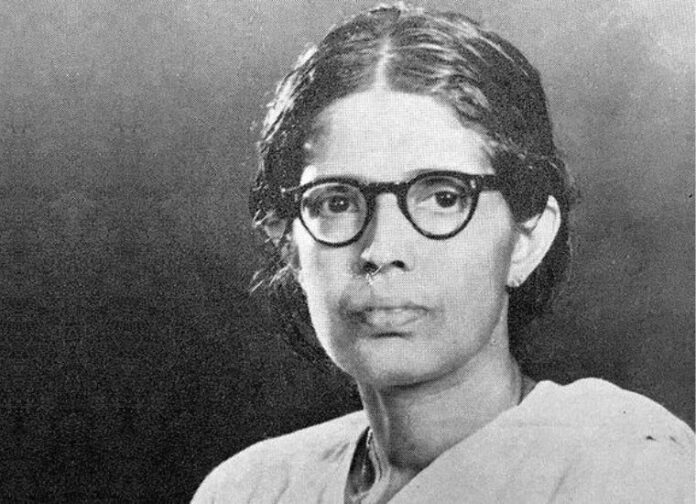Table of Contents
Balamani Amma, a name etched in the annals of Indian literature, stands as a revered figure in the world of poetry. Her verses, brimming with emotions and depth, have touched the hearts of countless readers across generations. In this article, we delve into the life and works of Balamani Amma, exploring her impact on the literary landscape and the bond she shared with her daughter. We also take a glimpse at her poems in Hindi, the profound quotes that emanated from her pen, and the books that preserve her profound wisdom.
Balamani Amma: A Poetic Journey

Born on July 19, 1909, in Nalappat, Kerala, Balamani Amma’s literary journey commenced at an early age. Her deep love for language and literature led her to create verses that reflected her thoughts and experiences. Despite the societal norms of her time, Balamani Amma’s determination to pursue education and writing remained steadfast. She broke barriers and shattered stereotypes, inspiring many women to follow their passions.
Balamani Amma Poems
Balamani Amma’s poems are a tapestry of emotions, vividly woven with words that strike a chord with readers of all ages. Her poetry often delved into themes of love, motherhood, nature, and spirituality. The verses exude a sense of wisdom and contemplation, reflecting the poet’s profound understanding of human emotions and the universe.
| Year | Poem |
| 1936 | Kudumbini (The Home-Maker) |
| 1938 | Dharmamargatthil |
| 1939 | Sthreehrdayam (A Woman’s Heart) |
| 1942 | Bhavanayil |
| 1942 | Prabhankuram |
| 1946 | Oonjalil (On the Swing) |
| 1949 | Kalikkotta (The Toy Basket) |
| 1951 | Velichathil (In the Light) |
| 1952 | Avar Padunnu (They Sing) |
| 1954 | Pranaman (Homage) |
| 1955 | Lokantarangalil (In Many Worlds) |
| 1958 | Sopanam |
| 1962 | Muttassi (Grandmother) |
| 1966 | Mazhuvinte katha |
| 1967 | Ambalathil (In the Temple) |
| 1968 | Nagarathil |
| 1971 | Veyilaarumbol |
| 1978 | Amruthamgamaya |
| 1987 | Nivedyam |
| 1988 | Mathruhridayam |
Balamani Amma and Her Daughter: An Unbreakable Bond
Amidst her literary pursuits, Balamani Amma embraced the roles of a mother and nurturer. Her daughter, Kamala Surayya (also known as Madhavikutty and Kamala Das), inherited her mother’s passion for writing. The bond between mother and daughter went beyond familial ties, as they shared a common passion for poetry. Balamani Amma’s support and encouragement played a pivotal role in shaping Kamala Surayya’s literary career.
Balamani Amma Poems in Hindi
While Balamani Amma is celebrated for her contributions to Malayalam literature, her poems have transcended linguistic barriers and have been translated into various languages, including Hindi. The essence and beauty of her verses have been preserved and appreciated by a wider audience, allowing her thoughts to resonate with people from diverse cultural backgrounds.
Balamani Amma Quotes
Balamani Amma’s poems were not only a source of emotional connection but also a wellspring of wisdom. Her quotes encapsulated life’s profound truths, offering solace and inspiration to those who sought meaning in the complexities of existence. From the simplicity of her words emerged pearls of insight that continue to guide and motivate readers.
FAQs on Balamani Amma
Balamani Amma is often referred to as the mother of Malayalam literature. She earned this title due to her significant contributions to Malayalam poetry and her pioneering role in the literary field, inspiring generations of writers.
Balamani Amma authored several notable works during her illustrious career. Some of her major works include: Nivedyam: This collection of poems is one of her most celebrated works, exploring themes of love, spirituality, and motherhood. Stree Hridayam: Another collection of poems that delves into the experiences and emotions of women, reflecting the struggles and joys they encounter in life. Muthassi: A poem that portrays the profound relationship between a grandmother and her grandchild, capturing the essence of familial bonds. Prabhankuram: In this collection, Balamani Amma delves into nature, expressing her reverence for the beauty and magnificence of the natural world.
The first poem of Balamani Amma is titled Kooppukai (The Puppet). It was published when she was just 13 years old, marking the beginning of her literary journey.
Thunchaththu Ezhuthachan is often considered the father of the Malayalam language. He was a 16th-century poet and scholar who made significant contributions to the development and standardization of the Malayalam script and language. He is best known for his work Adhyatma Ramayana, a retelling of the epic Ramayana in Malayalam.
The oldest known Malayalam literature is the Ramacharitam, a poetic work authored by Cheeraman, who is believed to have lived in the 13th century. The Ramacharitam is an epic poem that narrates the story of Lord Rama, and it is considered one of the earliest examples of literature in the Malayalam language. Who is known as the mother of Malayalam literature?
What are the major works of Balamani Amma?
Which is the first poem of Balamani Amma?
Who is the father of the Malayalam language?
Which is the oldest Malayalam literature?









